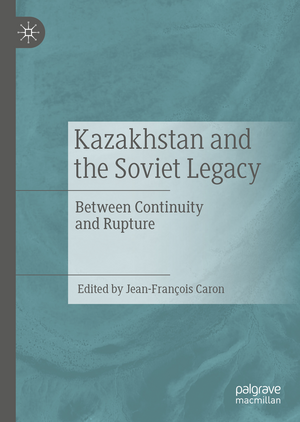Kazakhstan and the Soviet Legacy: Between Continuity and Rupture
Editat de Jean-François Caronen Limba Engleză Hardback – 3 apr 2019
What are the reasons for this reluctance or incapacity to break away from these ties of the past? Will the unavoidable political transition that will bring new individuals to the head of the state contribute to a real change? Will this lead to a break with the country’s past and a radical shift in the country’s policies or will things remain as they have been since 1991? This book provides some valuable insights on what may happen in the near future to the biggest country of Central Asia.
Preț: 781.15 lei
Preț vechi: 952.61 lei
-18% Nou
Puncte Express: 1172
Preț estimativ în valută:
149.47€ • 156.50$ • 123.98£
149.47€ • 156.50$ • 123.98£
Carte tipărită la comandă
Livrare economică 10-24 aprilie
Preluare comenzi: 021 569.72.76
Specificații
ISBN-13: 9789811366925
ISBN-10: 9811366926
Pagini: 206
Ilustrații: XIII, 209 p. 6 illus.
Dimensiuni: 148 x 210 mm
Greutate: 0.42 kg
Ediția:1st ed. 2019
Editura: Springer Nature Singapore
Colecția Palgrave Macmillan
Locul publicării:Singapore, Singapore
ISBN-10: 9811366926
Pagini: 206
Ilustrații: XIII, 209 p. 6 illus.
Dimensiuni: 148 x 210 mm
Greutate: 0.42 kg
Ediția:1st ed. 2019
Editura: Springer Nature Singapore
Colecția Palgrave Macmillan
Locul publicării:Singapore, Singapore
Cuprins
1. Introduction.- 2. Political Culture in Kazakhstan: Extension and Reflection.- 3. End of an Era? Kazakhstan and the Fate of Multivectorism.- 4. The Environmental Legacy of the Soviet Regime.- 5. Trials and Tribulations: Kazakhstan’s Criminal Justice Reforms.- 6. Comparing Political and Economic Attitudes: A Generational Analysis.- 7. Youth Organizations and State-Society Relations in Kazakhstan: The Durability of the Leninist Legacy.- 8. The Art of Managing Religion in a Post-Soviet Soft Authoritarian State.- 9. The Contemporary Politics of Kazakhisation: The Case of Astana’s Urbanism.
Recenzii
“The book will appeal to a wide range of readers including those with a general interest in Central Asian politics. ... The book is rich on context; it offers less when it comes to theoretical discussions about nation‐state and state‐building. ... the book will be a relevant read for those interested in studying Soviet policies and governance in post‐Soviet states.” (Javeed Ahwar, Journal of Soviet and Post-Soviet Politics & Society, JSPPS, Vol. 6 (2), 2020)
Notă biografică
Jean-François Caron is an Associate Professor and Chair of the Department of Political Science and International Relations at Nazarbayev University. His doctoral dissertation completed at the Université Laval (Canada) in 2010 focused on identity politics in multinational states. He has published articles about this topic in National Identities, Nationalism & Ethnic Politics as well the Journal of Intercultural Studies.
Textul de pe ultima copertă
This book examines Kazakhstan’s struggle to distance itself from its Soviet past over 25 years after its independence. To a very large extent, the affirmation of its sovereignty and a unique Kazakhstani way remain largely a matter of rhetoric. This book looks to explain the various aspects that show the continuity of Kazakhstan’s political system and governance with its colonial legacy, namely through its foreign policy, the country’s environmental policies, the judicial system, the management of religious diversity, the way youth organizations are structured and administered or how those who were born after the collapse of Soviet Union are still showing a typical Soviet behavioral attitude towards the political sphere.
Jean-François Caron is an Associate Professor and Chair of the Department of Political Science and International Relations at Nazarbayev University. His doctoral dissertation completed at the Université Laval (Canada) in 2010 focused on identity politics in multinational states. He has published articles about this topic in National Identities, Nationalism & Ethnic Politics as well the Journal of Intercultural Studies.
Caracteristici
Provides a comprehensive view of Kazakhstan's struggle to affirm its sovereignty
Exposes scholars outside of the region to Central Asian thinkers on political philosophy
Offers a local perspective on the changes Kazakhstan faces in light of Chinese investment and development
Exposes scholars outside of the region to Central Asian thinkers on political philosophy
Offers a local perspective on the changes Kazakhstan faces in light of Chinese investment and development
